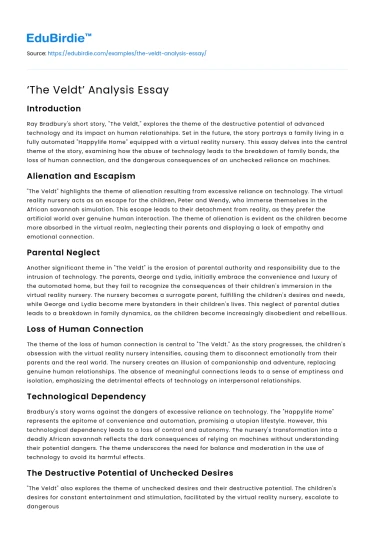Introduction
Ray Bradbury's short story, "The Veldt," explores the theme of the destructive potential of advanced technology and its impact on human relationships. Set in the future, the story portrays a family living in a fully automated "Happylife Home" equipped with a virtual reality nursery. This essay delves into the central theme of the story, examining how the abuse of technology leads to the breakdown of family bonds, the loss of human connection, and the dangerous consequences of an unchecked reliance on machines.
Alienation and Escapism
"The Veldt" highlights the theme of alienation resulting from excessive reliance on technology. The virtual reality nursery acts as an escape for the children, Peter and Wendy, who immerse themselves in the African savannah simulation. This escape leads to their detachment from reality, as they prefer the artificial world over genuine human interaction. The theme of alienation is evident as the children become more absorbed in the virtual realm, neglecting their parents and displaying a lack of empathy and emotional connection.
Save your time!
We can take care of your essay
- Proper editing and formatting
- Free revision, title page, and bibliography
- Flexible prices and money-back guarantee
Parental Neglect
Another significant theme in "The Veldt" is the erosion of parental authority and responsibility due to the intrusion of technology. The parents, George and Lydia, initially embrace the convenience and luxury of the automated home, but they fail to recognize the consequences of their children's immersion in the virtual reality nursery. The nursery becomes a surrogate parent, fulfilling the children's desires and needs, while George and Lydia become mere bystanders in their children's lives. This neglect of parental duties leads to a breakdown in family dynamics, as the children become increasingly disobedient and rebellious.
Loss of Human Connection
The theme of the loss of human connection is central to "The Veldt." As the story progresses, the children's obsession with the virtual reality nursery intensifies, causing them to disconnect emotionally from their parents and the real world. The nursery creates an illusion of companionship and adventure, replacing genuine human relationships. The absence of meaningful connections leads to a sense of emptiness and isolation, emphasizing the detrimental effects of technology on interpersonal relationships.
Technological Dependency
Bradbury's story warns against the dangers of excessive reliance on technology. The "Happylife Home" represents the epitome of convenience and automation, promising a utopian lifestyle. However, this technological dependency leads to a loss of control and autonomy. The nursery's transformation into a deadly African savannah reflects the dark consequences of relying on machines without understanding their potential dangers. The theme underscores the need for balance and moderation in the use of technology to avoid its harmful effects.
The Destructive Potential of Unchecked Desires
"The Veldt" also explores the theme of unchecked desires and their destructive potential. The children's desires for constant entertainment and stimulation, facilitated by the virtual reality nursery, escalate to dangerous levels. The nursery, influenced by the children's subconscious desires, creates a hostile environment, blurring the line between fantasy and reality. This theme serves as a cautionary tale about the dangers of uncontrolled desires and the consequences of allowing technology to fulfill every whim without considering the broader implications.
Conclusion
"The Veldt" serves as a cautionary tale, emphasizing the theme of the destructive potential of advanced technology and its impact on human relationships. Through the portrayal of a technologically advanced home and its virtual reality nursery, Bradbury warns against the alienation, parental neglect, loss of human connection, technological dependency, and unchecked desires that arise when technology supersedes genuine human interaction. The story serves as a reminder to maintain a balance between the benefits of technology and the preservation of meaningful relationships, highlighting the importance of human connection and the potential consequences of its erosion.






 Stuck on your essay?
Stuck on your essay?

